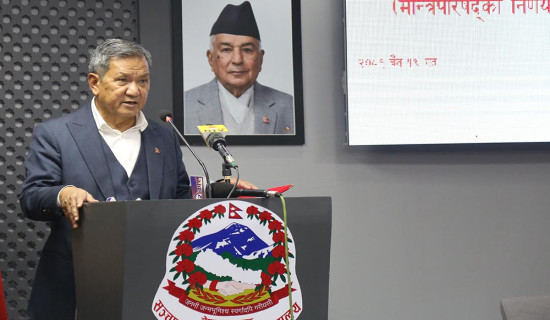- Tuesday, 1 April 2025
Karnali provincial govt announces vulture conservation plan
By Lalit Basel,Surkhet, Nov. 15: For the first time, the Karnali provincial government has shown interest in vulture conservation, recognising these birds as natural scavengers that help clean the environment by feeding on carcasses that would otherwise cause pollution.
The Bird Conservation Nepal, in coordination with the Karnali Province’s Ministry of Industry, Tourism, Forest and Environment, held a programme where the provincial government announced plans to allocate funds and launch conservation programmes dedicated to vultures.
The provincial government intends to introduce a budget and specific programmes for vulture conservation in the upcoming fiscal year.
Secretary at the Ministry, Dirgha Narayan Koirala, said that while no conservation efforts for vultures had been made in Karnali previously, the government would now allocate at least Rs. 2 million for the next fiscal year for conservation activities.
“These efforts include protecting trees and nests that serve as vulture habitats, establishing ‘vulture restaurants’, encouraging conservationists, conducting further research and generating awareness in communities,” he said.
Suresh Adhikari, Minister for Industry, Tourism, Forest and Environment, acknowledged the presence of various vulture species in Karnali and admitted the lack of past conservation initiatives. He suggested including vulture conservation topics in local educational curricula and expressed his commitment to pushing these efforts through the ministry.
Similarly, he said that forest division offices in all 10 districts of Karnali would receive instructions to implement conservation measures tailored to their specific needs starting next year.
Adhikari pledged to continue supporting vulture conservation efforts, directing officials to prioritise these initiatives. He stressed the importance of widespread commitment to vulture conservation.
Bhupal Nepali, Project Officer of Bird Conservation Nepal, explained that many vultures died due to the use of Diclofenac Sodium in the past. However, since Nepal imposed a ban on Diclofenac in veterinary medicine on May 6, 2006, vulture numbers have started to rise.
Conservation activist Gobind Bahadur Singh from Barekot in Jajarkot welcomed the Karnali government's interest, saying that prior efforts had lacked government involvement. Singh believed that further research and conservation goal could be achieved with adequate funding and planning.
709 vulture nests in Nepal
Nepal has 709 vulture nests, with 512 reported as active. Of the world’s 23 vulture species, nine are found in Nepal, including six native and three migratory species. Among these, the Egyptian Vulture, Himalayan Vulture, Red-headed Vulture, slender-billed vulture and white vulture are endangered.
212 vultures in Karnali
In Karnali, 212 vultures and 63 nests have been identified across several districts, including Jajarkot, Surkhet and Rukum West. Of the nine species found in Nepal, five are present in Karnali, all listed as endangered.




-square-thumb.jpg)

(1)copy-original-thumb.jpg)









